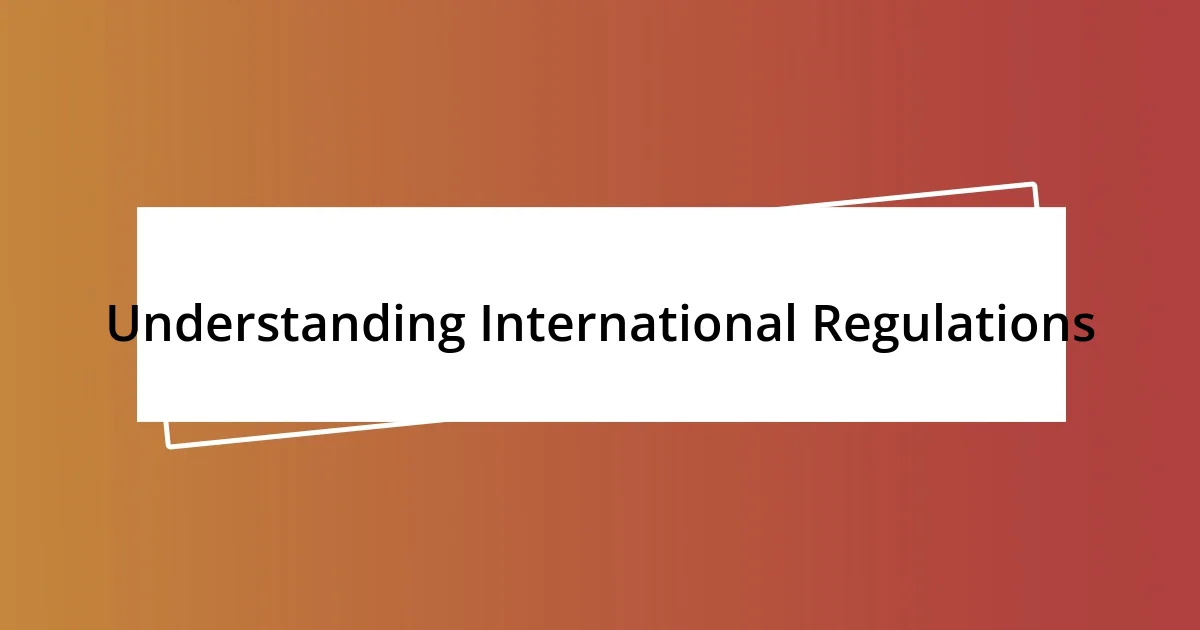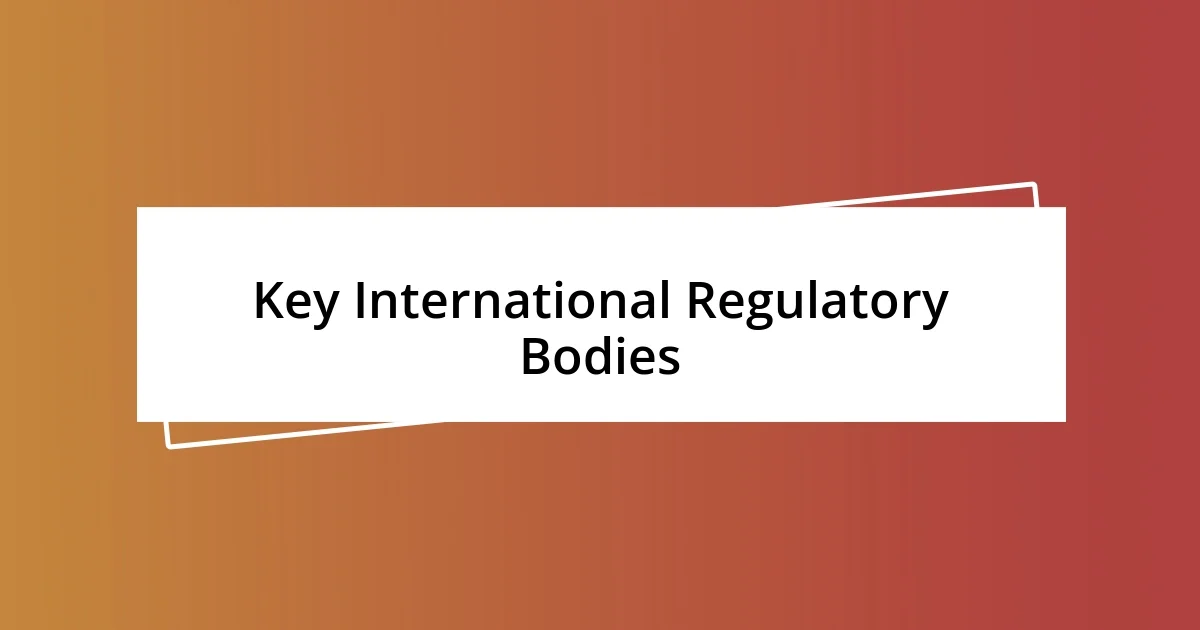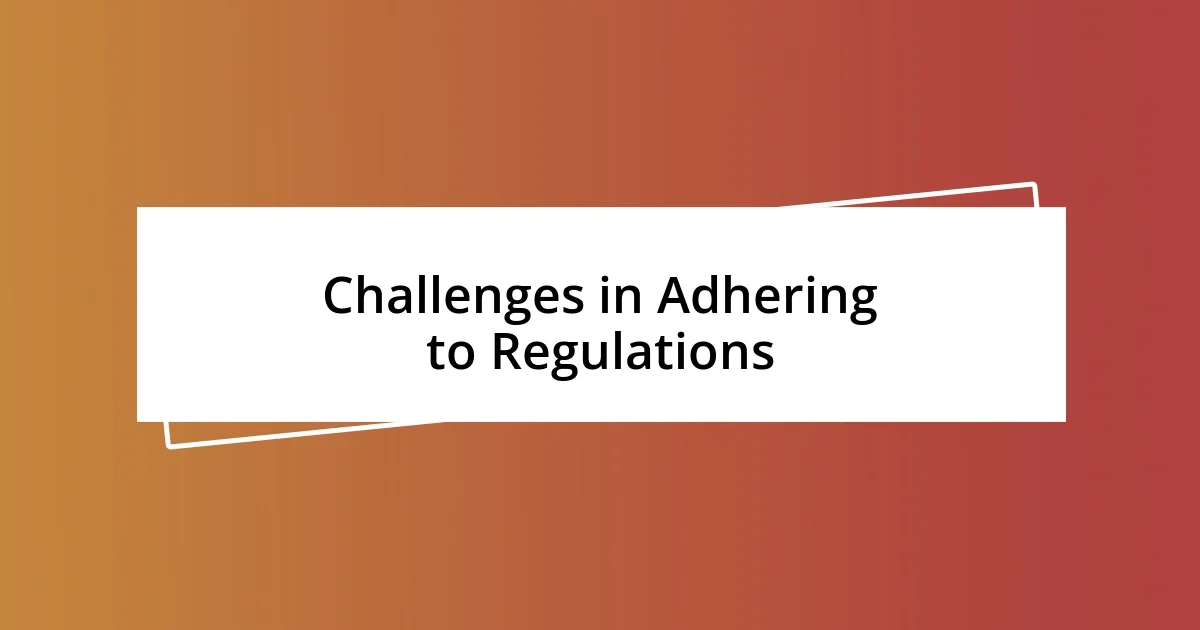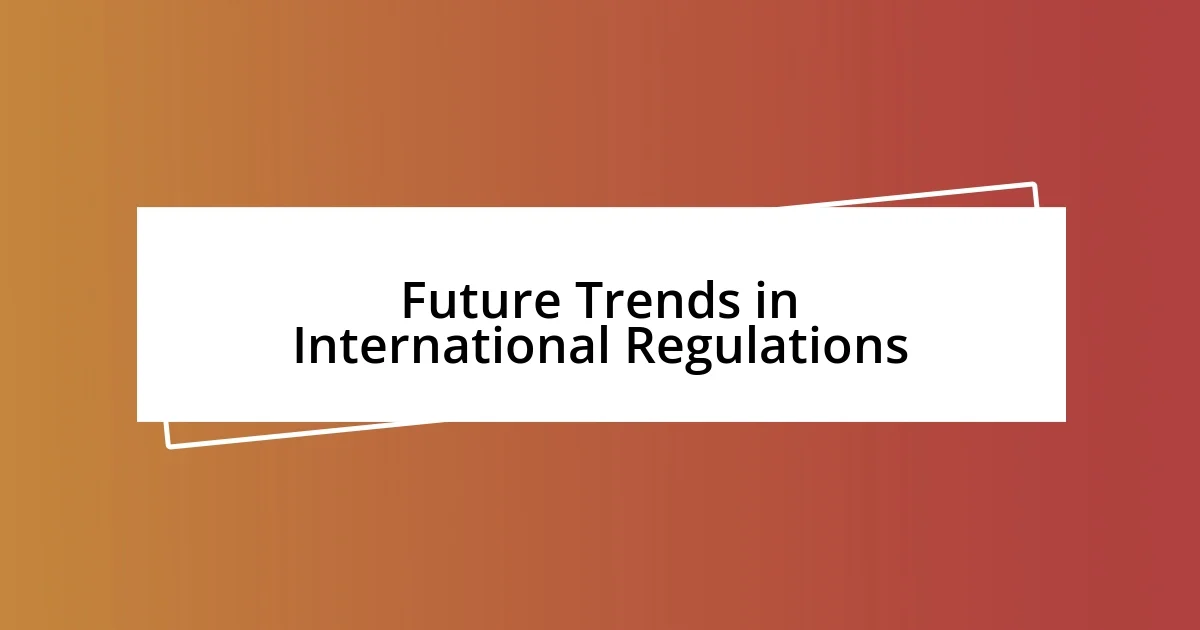Key takeaways:
- Understanding international regulations is essential for fostering global cooperation, impacting local businesses through trade agreements and compliance efforts.
- Proactive compliance builds trust, enhances reputation, and opens new market opportunities, emphasizing the need for clear internal controls and ongoing employee training.
- Future trends indicate a shift towards sustainability, technological advancements in compliance processes, and the importance of international collaboration for standardization.

Understanding International Regulations
Understanding international regulations can feel overwhelming, especially when you first dive into the complex web of laws and guidelines that govern global interactions. I remember my initial days navigating through these regulations; it was like stepping into an intricate maze. One might wonder, how does one begin to unravel this complexity?
When I bumped into international trade agreements during my career, it struck me how these regulations could impact local businesses dramatically. It’s fascinating to see how a simple change in a treaty could ripple out, affecting everything from pricing to product availability in my community. Have you ever thought about how something as vast as international law can shape your everyday life in such an intimate way?
I’ve come to understand that international regulations serve as the bedrock for global cooperation, fostering peace and encouraging economic growth. Yet, despite their importance, I often find that many people overlook these rules. It makes me reflect on what might be missed if we don’t take the time to understand the benefits they bring to society as a whole. Isn’t it worth our investment of effort to grasp these crucial guidelines?

Importance of Compliance in Business
Compliance is not just about following rules; it’s about building trust with customers and partners. In my experience, companies that prioritize compliance often enjoy a stronger reputation in the market. I once worked with a client who faced fallout from non-compliance. It was a vivid reminder of how a single oversight can lead to a loss of business and credibility.
For me, the emotional impact of compliance can’t be overstated. It not only shields businesses from hefty fines but also fosters a culture of integrity within the organization. I remember leading a training session where employees expressed relief at having clarity around compliance measures. Their reactions highlighted an often-overlooked aspect: when teams feel assured that their company is adhering to regulations, they can focus more on innovation and collaboration. Isn’t that a win-win?
Furthermore, proactive compliance can open doors to new markets. A friend of mine in the tech industry realized this when his company sought to expand internationally. By understanding and adhering to the local regulations, they gained a competitive edge over rivals who hadn’t done their homework. It’s these real-life scenarios that confirm the pivotal role compliance plays in not just survival, but growth in today’s business landscape.
| Aspect | Outcome |
|---|---|
| Strong Compliance Culture | Enhanced Reputation |
| Employee Assurance | Increased Innovation |
| Proactive Approach | Expanded Market Opportunities |

Key International Regulatory Bodies
Key International Regulatory Bodies play a crucial role in ensuring that global standards and practices are followed. I’ve often marveled at how these organizations connect countries and create frameworks for cooperation. For instance, my own encounters with the World Trade Organization (WTO) allowed me to appreciate the delicate balance between trade rules and member state interests. It’s incredible to see how these regulations facilitate everything from international trade to environmental protection, shaping a better world for all of us.
Here are some key international regulatory bodies to note:
- World Trade Organization (WTO): Oversees international trade rules and resolves disputes between member countries.
- International Organization for Standardization (ISO): Develops and publishes international standards for a variety of industries to ensure quality and safety.
- International Maritime Organization (IMO): Regulates shipping and ensures safe, secure, and efficient shipping on clean oceans.
- Financial Action Task Force (FATF): Implements measures to combat money laundering and terrorist financing globally.
- World Health Organization (WHO): Focuses on international public health, coordinating responses to health emergencies and setting health standards.
Reflecting on my interactions with these bodies, it’s clear that their collective efforts create a more stable global environment. Each organization, with its distinct mission and regulations, acts like a thread in a larger tapestry, weaving resilience into the fabric of international relations. This interconnectedness not only nurtures economies but also upholds shared values among nations.

Major International Agreements Explained
The landscape of international agreements can be quite fascinating, and I’ve found that each one serves a unique purpose in promoting global cooperation. For instance, the Paris Agreement on climate change is a remarkable example of how countries can unite to combat a pressing issue. I recall attending a climate forum where delegates shared stories about their countries’ efforts to reduce carbon emissions; it was inspiring to see that collective commitment to an idea greater than any individual nation’s agenda.
Then there’s the North American Free Trade Agreement (NAFTA), which transformed trade relationships between the U.S., Canada, and Mexico. I distinctly remember a business summit where companies discussed the impact of tariff-free access to markets. Participants were excited about the new opportunities this agreement created for small businesses. It made me realize that international agreements not only mold economic landscapes but also empower industries and individuals who may not have had a voice otherwise.
Relating it to my experience, the General Agreement on Tariffs and Trade (GATT), predecessor to the WTO, taught me how crucial it is to establish a stable environment for trading. I once worked on a project that analyzed trade barriers, and I was stunned to see how reducing tariffs improved trade volumes among member nations. Isn’t it fascinating how these agreements can shift entire economies and even impact local communities? I often wonder how many innovative ideas are sparked simply because of access created by these international accords.

Challenges in Adhering to Regulations
Navigating international regulations can feel like a daunting maze, and I’ve witnessed firsthand how cultural differences can complicate compliance efforts. For example, while working on a project that involved several countries in Europe, I found that varying interpretations of the same regulation could create misunderstandings and delays. Have you ever been in a situation where what seems obvious to you can be misinterpreted by someone from another culture? It’s a reminder of how crucial effective communication is in these contexts.
The bureaucratic layers involved in regulation can sometimes feel overwhelming. I recall a time when I had to gather documentation for a compliance audit across multiple jurisdictions. As I sifted through endless forms, I realized how time-consuming and tedious the process can be. Isn’t it frustrating to think that what could be a straightforward task often turns into a logistical nightmare? It’s a clear example of how red tape can hinder operational efficiency.
Lastly, financial constraints can pose significant hurdles for many organizations trying to adhere to international regulations. During a consulting stint, I worked with a small business that wanted to expand globally but struggled to allocate resources for compliance training and legal counsel. I couldn’t help but empathize with their passion—dreaming big but feeling held back by financial limitations. This experience made me wonder: how can emerging companies find the support they need to thrive in a global market? It’s crucial that we address these disparities to foster fair competition and innovation.

Practical Steps for Compliance
When it comes to compliance, the first practical step I always emphasize is conducting thorough research on the specific regulations applicable in each jurisdiction. I once led a team that was tasked with expanding into Asia, and I remember spending countless evenings poring over local laws. The revelation for me was how regulations I hadn’t even considered became pivotal to shaping our strategy. Have you ever felt overwhelmed by the amount of information out there? It’s essential to remember that a well-informed foundation can prevent costly missteps down the road.
Establishing robust internal controls is another vital step. In my past experiences, I’ve seen companies that built compliance teams comprised of local experts who understand the unique intricacies of their markets. I recall a case where a newly formed compliance team identified subtle local nuances that significantly impacted our operations. It made me realize that these specialized insights can transform compliance from a daunting task into an integrated part of the business strategy. Isn’t it empowering to think that the right team can redefine how you approach regulations?
Lastly, ongoing training and communication are key components that I’ve consistently found to be necessary. I remember facilitating a compliance workshop for a multinational corporation. The enthusiasm among the employees was palpable as they grasped how compliance wasn’t just a box to tick but an essential aspect of their roles. The questions they asked—about practical applications and ethical dilemmas—reminded me of how vital this evolving dialogue can be. Do you see your compliance initiatives as a shared responsibility? Creating a culture of compliance not only fosters understanding but also reinforces the importance of adherence at every level of an organization.

Future Trends in International Regulations
As we look to the future, one major trend in international regulations is the increasing focus on sustainability and environmental responsibility. I recently attended a global conference where the consensus was clear: regulations are shifting to prioritize eco-friendly practices and transparency in supply chains. Have you noticed how consumers are demanding more ethical practices from businesses? This shift is not just a passing trend; organizations that fail to adapt risk losing their competitive edge.
Moreover, technological advancements are poised to transform regulatory compliance. In my experience with compliance software, I’ve seen how artificial intelligence can streamline reporting and monitoring processes. I can’t help but think back to a project where implementing AI solutions reduced reporting time by half! Isn’t it exciting to consider how technology might eliminate some of the bureaucratic hurdles that frustrate businesses today? This integration will allow companies to focus more on innovation rather than getting bogged down by paperwork.
Finally, the role of international collaboration and standardization is likely to grow significantly. I recall a time when my team was involved in discussions with global partners to unify certain compliance standards. The conversations often revealed common challenges, and it became evident that working together could foster a more cohesive approach. Isn’t it refreshing to envision a world where businesses share best practices and standards? I believe such collaboration can not only enhance compliance efforts but also create a more predictable regulatory landscape for everyone involved.












